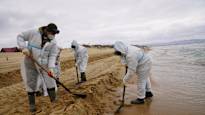ANAPA On a sunny January day, a month after the Black Sea tanker accident, Anapa’s sandy beach starts to look clean.
A thick layer of heavy fuel drifted onto the sandy beaches of the spa town when two tankers had an accident in mid-December near the Kerchinsalmi.
– There was a huge layer of oil product, fuel oil, in the entire area of the beach. It was about 30–40 centimeters thick and the layer was 10–15 meters deep, an activist of the NGO My vmeste Darya Suharevskaya tells.
A volunteer collecting fuel oil with a shovel on the beach Artyom Kornienko says that in the beginning you couldn’t work on the beach without a respirator.
– Shock and upset, he describes his mood.
– It is our district, our country. It was very sad to see such a sight.
Now the thick layer of fuel oil has been cleaned away, but the cleaning work continues.
A month after the accident, employees and volunteers are still walking on the beach in white protective clothing and collecting fuel in sacks with shovels.
A tanker accident stains the shores of the Black Sea and the Sea of Azov
Two tankers, Volgoneft-212 and Volgoneft-239, were caught in a heavy storm on December 15 near Kerchinsalmi.
Volgoneft-212 broke up, killing one crew member. Volgoneft-239 was damaged and ran aground.
The cargo of the tankers was a total of more than 9,000 tons of fuel oil. The authorities have estimated that 2,400 tons would have ended up in the sea, but the actual amount may be higher.
The tankers were designed for river transport and should not have been at sea in stormy conditions. In addition, the ships were elderly, built in 1969 and 1973.
Fuel oil, or bunker oil, is a very heavy and stiff fuel. It does not remain floating on the surface, but sinks to the bottom of the sea or to seawater layers. Therefore, the usual means of collecting oil spilled into the sea do not work.
– Demarcation with booms is practically ineffective, because the booms do not stop the fuel oil, head of the press service of the Krasnodar district Even Pavel Tychkin explain.
He says that most of the cleaning work on the beaches of Anapa has been done. All that’s left is fine-tuning.
The nature of the Black Sea took on a new burden
– In my opinion, this is the most serious ecological disaster in Russia since the beginning of the 21st century. This unprecedented event, the Institute of Water Problems of the Russian Academy of Sciences Viktor Danilov-Danilyan quoth For the Kommersant newspaper.
The war had already caused environmental damage to the Black Sea. The oil spill increases the load on the sea even more. Fuel oil has washed ashore at least on the coast of the Krasnodar district and the Crimean peninsula.
Delfa, a center specializing in rescuing dolphins told that he found 58 dead dolphins in the weeks following the accident. There is no certainty as to the cause of death of the animals and whether more dolphins have died than average.
In December, it was reported that Black Sea porpoises (Phocoena phocoena relicta), a highly endangered species, had been found dead on the beach.
In addition, the oil spill is believed to have killed tens of thousands of birds. Fuel oil also threatens the area’s natural parks, through which migratory birds fly. In spring, for example, the Tamano-Zaporožje nature reserve is visited by a million birds.
Supervisory authority Rosselhosnadzor, on the other hand tellsthat no pollution has been detected in the fish of the Black Sea and the Sea of Azov in the samples collected on January 15.
Official actions have been criticized for their slowness
In Anapa, the authorities and voluntary organizations present how efficiently the volunteers are organized, how the care of the birds affected by the oil is organized and how the sand collected from the beaches, messed up by the oil nozzle, is temporarily stored.
We don’t get to see the wrecked tanker, from which the authorities have started to remove fuel oil.
We also hear that at least some of the volunteers had been strongly advised not to speak to the foreign media.
According to the information spread in the Russian media, everything did not go well in the beginning. Poorly equipped locals fought the fuel oil with shovels.
A group of Anapa residents sent to the president and prime minister video messagein which they asked to save the city.
– The local authorities cannot cope with this, they do not have the resources for this. The only resource is ordinary people with shovels. Such a disaster cannot be overcome with shovels alone, the resident said in a video message.
The slowness of official actions was also criticized by the president in January Vladimir Putin.
Fuel oil hits the coastal town’s economy
The oil spill threatens Anapa’s central business, tourism. The authorities hope that the traces could be cleaned up by the summer holiday season. Experts suspect that the problem will not be solved soon. When the temperatures rise with the arrival of summer, the fuel oil left at the bottom of the sea begins to float and spread.
On a sunny, calm day in January, Anapa’s beach already looks clean, but when the waves in the sea reach towards the evening, new fuel oil starts drifting onto the beach again. The smell of fuel hangs in the air.
Strong waves tear the nets that have been set up on the shore to collect fuel oil. The white nets are black from the oil the next day.
